Suzuki S-Cross VS Toyota Yaris Cross
In the battle between the Suzuki S-Cross and the Toyota Yaris Cross, both compact SUVs bring unique strengths to the table. The S-Cross impresses with its spacious interior and robust performance, making it an ideal choice for family adventures. Meanwhile, the Yaris Cross stands out for its urban agility and fuel efficiency, appealing to city dwellers seeking practicality without compromising style.
Suzuki S-Cross
The Suzuki S-Cross emerges as a versatile crossover, blending urban agility with a rugged presence suited for diverse terrains. Its design combines sleek, modern aesthetics with practicality, offering a spacious interior that comfortably accommodates passengers and cargo for varied journeys. Drivers will appreciate the advanced technology features that enhance both driving pleasure and safety, making the S-Cross a well-rounded option for those seeking reliability and style in a compact SUV.
detailsToyota Yaris Cross
The Toyota Yaris Cross combines the practicality of a compact SUV with the agility of a smaller car, making it ideal for urban adventures. Its elevated seating position offers excellent visibility, while the stylish design ensures it stands out on the city streets. Inside, the Yaris Cross boasts a modern interior with advanced technology features designed to enhance the driving experience.
detailsIn the competitive world of compact SUVs, two models have garnered significant attention in the market: the Suzuki S-Cross and the Toyota Yaris Cross. Both vehicles offer a unique blend of style, efficiency, and advanced technology, making them strong contenders for buyers seeking a versatile and economical option. This comparison aims to dissect the technical aspects and innovations of these two SUVs to help potential buyers make an informed choice.
Design and Dimensions
Starting with their dimensions, the Suzuki S-Cross measures 4300 mm in length, 1785 mm in width, and 1580 mm in height. This gives it a larger footprint compared to the Toyota Yaris Cross, which is slightly smaller at 4180 mm long, 1765 mm wide, and 1595 mm high. The S-Cross boasts a trunk capacity of 430 liters, providing ample luggage space for family outings or trips. In contrast, the Yaris Cross offers a trunk capacity of 397 liters and varying figures for different variants, making it still a practical choice but slightly less capacious than its Suzuki competitor.
Engine Performance & Specifications
When it comes to engine options, both vehicles present compelling choices for drivers. The Suzuki S-Cross features a selection of both petrol and hybrid powertrains, with power outputs ranging from 116 to a robust 129 HP. The S-Cross achieves a respectable acceleration of 0-100 km/h in 9.5 seconds, making it competitive in terms of performance. The engine choices come with a fuel consumption range of 5.1 to 5.8 L/100 km, while CO2 emissions vary from 116 to 131 g/km, putting it in the D CO2 efficiency class.
On the other hand, the Toyota Yaris Cross is powered exclusively by a full hybrid engine, producing between 116 and 130 HP. However, the performance in terms of acceleration is slightly lagging behind, registering between 10.7 to 11.3 seconds for the 0-100 km/h sprint. The fuel economy results are more impressive, with consumption figures sitting between 4.5 and 4.8 L/100 km, reflecting its C CO2 efficiency class, with emissions as low as 101 g/km.
Transmission & Drive Options
The Suzuki S-Cross offers a variety of transmission options, including a manual gearbox and automated manual transmission, appealing to a wide range of driving preferences. Its available front-wheel drive (FWD) and all-wheel drive (AWD) system enhances its versatility, allowing for better traction on various terrains.
Conversely, the Toyota Yaris Cross comes equipped solely with a Continuously Variable Transmission (CVT). While this choice simplifies the driving experience, the absence of AWD might deter buyers needing additional traction for off-road or adverse conditions. The Yaris Cross retains a front-wheel drive layout, which is standard in this segment.
Interior Comfort & Technology
Both SUVs can accommodate up to five passengers comfortably, but the interior layout and technology features set them apart. The Suzuki S-Cross stands out with its spacious feel and thoughtful design, which includes advanced infotainment options. It features an intuitive touchscreen interface with smartphone integration, providing seamless connectivity for users.
The Yaris Cross, while slightly smaller, does not fall short in terms of technology. It offers a user-friendly infotainment system, and the quality of materials used in the cabin reflects Toyota's commitment to durability and user experience. Additionally, Toyota's focus on safety innovations, such as the Toyota Safety Sense package, adds significant value to the Yaris Cross.
Conclusion: Which One to Choose?
Ultimately, the decision between the Suzuki S-Cross and the Toyota Yaris Cross boils down to individual preferences and priorities. If you value a larger vehicle with more trunk space and multiple drivetrain options, the Suzuki S-Cross could be the ideal pick for you. However, if fuel efficiency, hybrid technology, and a robust safety suite are more important, the Toyota Yaris Cross may steal the spotlight.
Both SUVs have their strengths and weaknesses, and either one would make a promising addition to the compact SUV segment. Whether you crave performance, efficiency, or advanced technology, both the S-Cross and the Yaris Cross stand ready to meet your automotive needs in style.
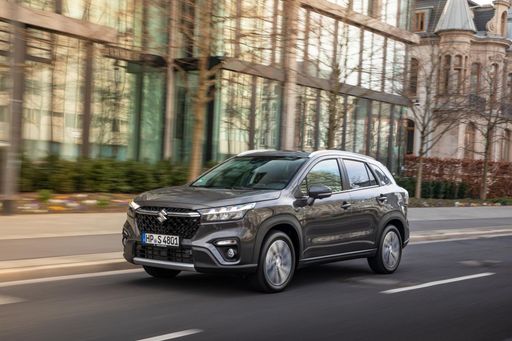 @ Suzuki
@ Suzuki
 @ Suzuki
@ Suzuki
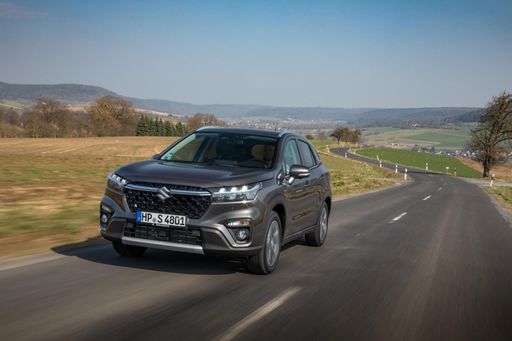 @ Suzuki
@ Suzuki
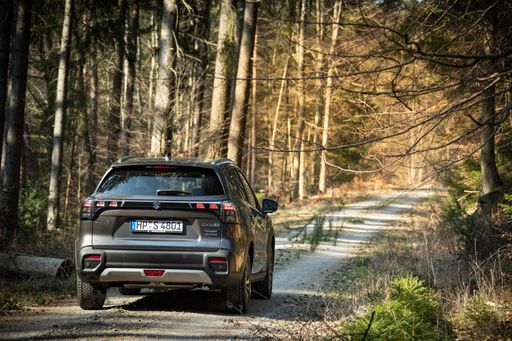 @ Suzuki
@ Suzuki
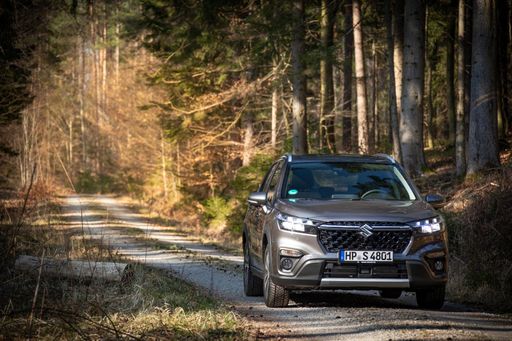 @ Suzuki
@ Suzuki
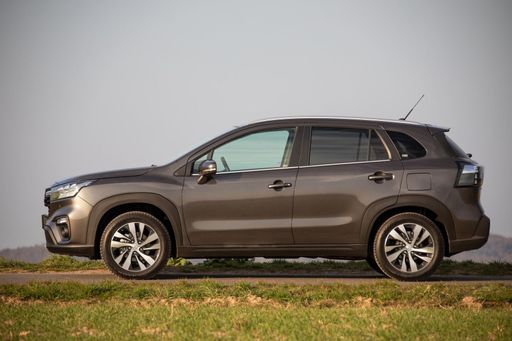 @ Suzuki
@ Suzuki
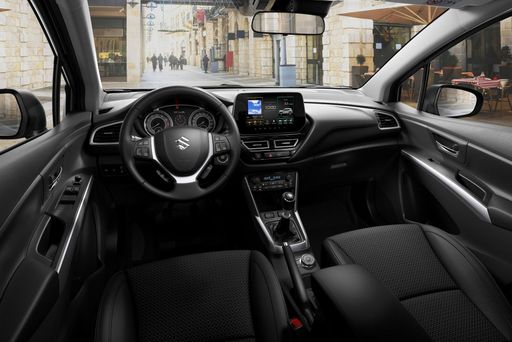 @ Suzuki
@ Suzuki
 @ Toyota
@ Toyota
 @ Toyota
@ Toyota
 @ Toyota
@ Toyota
 @ Toyota
@ Toyota
 @ Toyota
@ Toyota
 @ Toyota
@ Toyota
 @ Toyota
@ Toyota

|

|
|
|
|
Costs and Consumption |
|
|---|---|
|
Price
about 26900 - 33700
£
|
Price
about 24200 - 33900
£
|
|
Consumption L/100km
5.1 - 5.8
L
|
Consumption L/100km
4.5 - 4.8
L
|
|
Consumption kWh/100km
-
|
Consumption kWh/100km
-
|
|
Electric Range
-
|
Electric Range
-
|
|
Battery Capacity
-
|
Battery Capacity
-
|
|
co2
116 - 131
g/km
|
co2
101 - 108
g/km
|
|
Fuel tank capacity
47
L
|
Fuel tank capacity
36
L
|
Dimensions and Body |
|
|
Body Type
SUV
|
Body Type
SUV
|
|
Seats
5
|
Seats
5
|
|
Doors
5
|
Doors
5
|
|
Curb weight
1280 - 1435
kg
|
Curb weight
1180 - 1290
kg
|
|
Trunk capacity
430
L
|
Trunk capacity
320 - 397
L
|
|
Length
4300
mm
|
Length
4180
mm
|
|
Width
1785
mm
|
Width
1765
mm
|
|
Height
1580
mm
|
Height
1595
mm
|
|
Payload
375 - 405
kg
|
Payload
485 - 510
kg
|
Engine and Performance |
|
|
Engine Type
Full Hybrid, Petrol MHEV
|
Engine Type
Full Hybrid
|
|
Transmission
Automatic, Manuel
|
Transmission
Automatic
|
|
Transmission Detail
Automated Manual, Manual Gearbox
|
Transmission Detail
CVT
|
|
Drive Type
Front-Wheel Drive, All-Wheel Drive
|
Drive Type
Front-Wheel Drive
|
|
Power HP
116 - 129
HP
|
Power HP
116 - 130
HP
|
|
Acceleration 0-100km/h
9.5
s
|
Acceleration 0-100km/h
10.7 - 11.3
s
|
|
Max Speed
175 - 195
km/h
|
Max Speed
170
km/h
|
|
Torque
235
Nm
|
Torque
-
|
|
Number of Cylinders
4
|
Number of Cylinders
3
|
|
Power kW
85 - 95
kW
|
Power kW
85 - 96
kW
|
|
Engine capacity
1373 - 1462
cm3
|
Engine capacity
1490
cm3
|
|
Top speed
175 - 195
km/h
|
Top speed
170
km/h
|
General |
|
|
Model Year
2024
|
Model Year
2024
|
|
CO2 Efficiency Class
D
|
CO2 Efficiency Class
C
|
|
Brand
Suzuki
|
Brand
Toyota
|
Suzuki S-Cross
Introducing the Versatile Suzuki S-Cross
The Suzuki S-Cross stands out as a remarkable offering in the competitive SUV market, combining practicality with modern technology. This car is designed to cater to a diverse range of drivers, offering innovative hybrid technology alongside a comfortable and spacious interior.
Efficient Performance: The Heart of the S-Cross
At the core of the Suzuki S-Cross are its hybrid engine options. Customers can choose between a mild-hybrid or a full-hybrid engine, which both provide impressive fuel efficiency and driveability. The mild-hybrid 1.4 Boosterjet comes with a manual transmission, while the 1.5 Dualjet full-hybrid offers an automatic option. This flexibility ensures that there's an S-Cross model for everyone.
Technical Brilliance and Engineering
The Suzuki S-Cross excels with a range of technical specifications. Offering between 116 to 129 PS, the vehicle also boasts a CO2 efficiency class of D, maintaining an eco-friendly performance with CO2 emissions ranging from 118 to 132 g/km. With a top speed of up to 195 km/h and a nimble 0-100 km/h acceleration of just 9.5 seconds, the S-Cross demonstrates dynamic capability without compromising on environmental consciousness.
Innovative Design and Spacious Comfort
The exterior dimensions, with a length of 4300 mm, a width of 1785 mm, and a height of 1580 mm, provide a substantial presence while offering a spacious interior. The boot space of 430 litres, combined with a seating capacity for five, ensures that the S-Cross is as practical as it is comfortable.
Driving Experience and Versatility
The S-Cross provides a choice between front-wheel drive and the all-terrain ALLGRIP all-wheel-drive system, allowing for flexibility depending on the driver's needs. The suspension and handling have been finely tuned to deliver a smooth driving experience across various conditions, further underscoring the vehicle's versatility.
Cost Efficiency and Ownership
When it comes to cost, the Suzuki S-Cross offers competitive pricing, with monthly costs ranging from €909 to €1045 and an economical cost per kilometre of 36.4 to 41.8 cents. This makes it an attractive option for those seeking cost-effective motoring without sacrificing performance or style.
Conclusion
The Suzuki S-Cross remains an impressive contender in the SUV segment, offering a blend of efficient hybrid engines, practical design, and state-of-the-art technology. Whether you're navigating city streets or exploring off the beaten path, the S-Cross provides a reliable and stylish driving solution.
Toyota Yaris Cross
Discovering the Toyota Yaris Cross: The Compact SUV Redefined
The Toyota Yaris Cross has boldly entered the compact SUV market, sporting a blend of sleek aesthetics, advanced hybrid technology, and practical functionality. As urban driving dynamics evolve, this vehicle meets the demands of modern motorists with an impressive performance and eco-friendly technology, setting itself apart in a bustling segment.
Performance and Efficiency: Hybrid Innovation at Its Best
The Yaris Cross is designed to provide an engaging driving experience combined with remarkable efficiency. At its heart lies a full hybrid powertrain, offering options between 116 PS and 130 PS, efficiently paired with Toyota's CVT automatic transmission. The hybrid system seamlessly integrates a petrol engine with an electric motor, optimising power delivery and responsiveness.
Drivers will appreciate the low fuel consumption, which ranges from 4.5 to 4.8 litres per 100 km, and equally impressive CO2 emissions of 101 to 108 g/km, aligning with the industry's ongoing commitment to sustainability.
Design and Dimensions: Compact Yet Spacious
The Yaris Cross offers a perfect blend of compact design and interior spaciousness, making it an ideal choice for urban environments. Measuring 4,180 mm in length, 1,765 mm in width, and 1,595 mm in height, the vehicle manages to provide a refined SUV stature without sacrificing manoeuvrability.
Its five-door layout and flexible boot space, ranging from 320 to 397 litres, make it practical for everything from city commutes to weekend getaways. The increased ride height adds to the SUV appeal, providing drivers with that coveted higher driving position and improved visibility.
Advanced Technology and Features
The Toyota Yaris Cross is well-equipped with an array of technological features, defined by its various trim levels including the Business Edition CVT, Comfort CVT, and the sporty GR Sport CVT. Each model is crafted to cater to diverse consumer needs, whether one prioritises enhanced comfort, sporty aesthetics, or comprehensive safety features.
Key innovations include a state-of-the-art infotainment system, advanced driver assistance features, and the Toyota Safety Sense package that enhances driver confidence through adaptive cruise control, lane keep assist, and more.
Driving Experience: Safety and Comfort in Focus
The Yaris Cross is not just about performance but also ensures safety and comfort for all occupants. The vehicle offers a smooth and quiet ride thanks to its refined suspension system and cleverly designed cabin, reducing noise and vibration levels.
The advanced safety suite within the Yaris Cross, encompassing multiple airbags, stability control, and a host of driver assistance systems, is designed to provide protection and peace of mind, every time you step into the driver's seat.
Conclusion: A New Benchmark in the Compact SUV Segment
The Toyota Yaris Cross stands as a testament to Toyota's commitment to producing environmentally friendly vehicles without compromising on performance or style. It strikes a harmonious balance between innovation, efficiency, and practicality, offering consumers a compact SUV that is both exciting to drive and easy to live with.
As we move further into an era of hybrid advancements and smarter automotive solutions, the Yaris Cross embodies these principles exceptionally, proving to be a robust and reliable partner for the modern driver.
